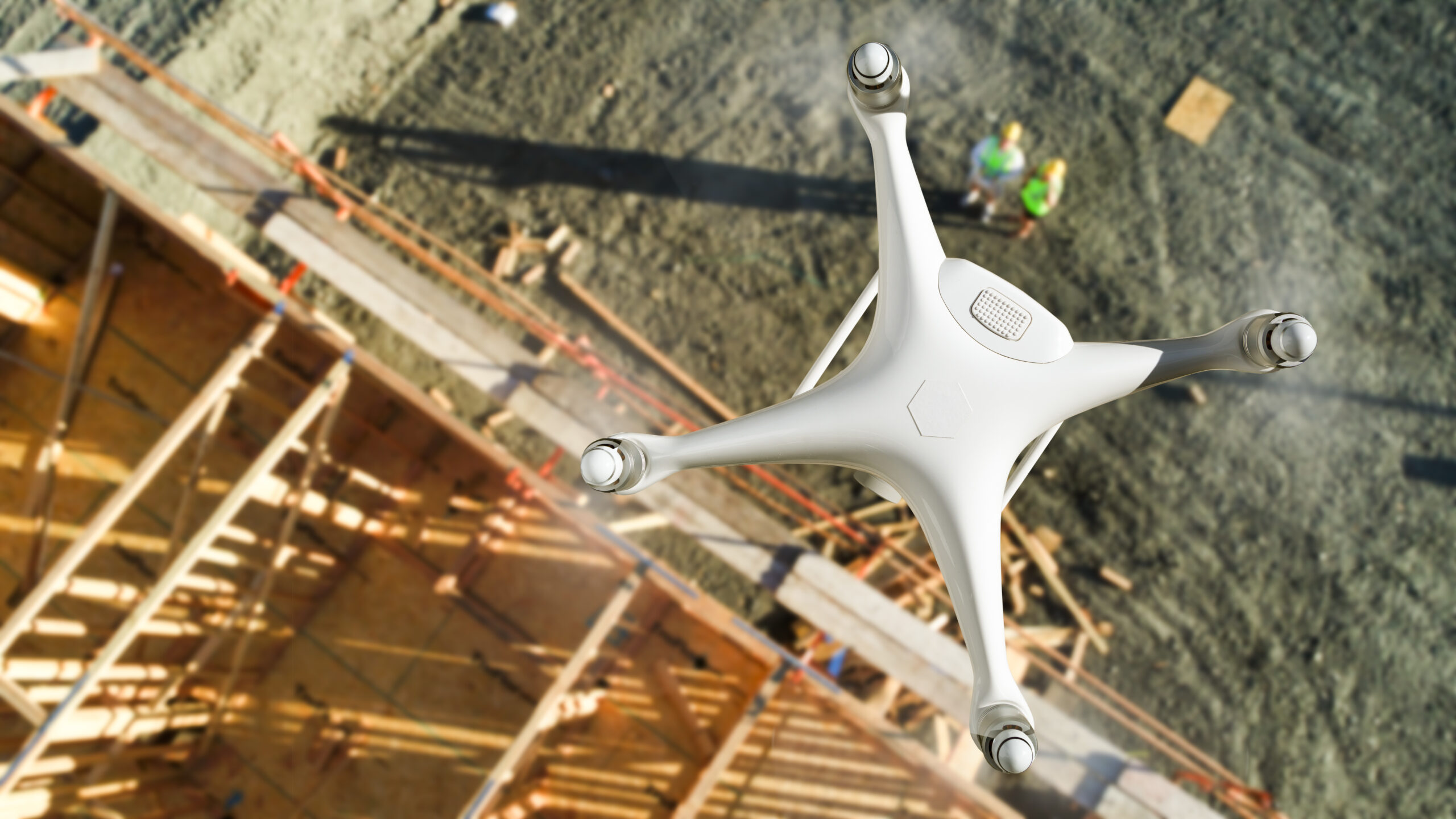Soaring to Success: Drones as an Essential Tool in Construction Project Management
by siteadmin

In the realm of construction, where precision, efficiency, and safety are paramount, innovative technologies are rapidly reshaping the landscape. Among these technological marvels, drones have emerged as a game-changing tool for construction project management. From surveying and site inspections to progress monitoring and safety enhancements, drones offer a multitude of advantages that have become indispensable for project managers. In this article, we will delve into the pivotal role that drones play in construction project management, exploring the ways they streamline processes, save costs, and enhance overall project success.
1. Aerial Surveys and Site Inspections
Traditionally, conducting aerial surveys and site inspections involved substantial time and resources. Project managers often relied on manned aircraft or ground surveys, which were expensive, time-consuming, and posed inherent risks. Drones, equipped with high-resolution cameras and LiDAR technology, have revolutionized this aspect of construction project management.
With drones, project managers can quickly and accurately assess the condition of a construction site. They capture detailed aerial images and create 3D models, allowing for a comprehensive overview of the entire project area. This data is invaluable for identifying potential issues, determining the optimal layout, and establishing an efficient plan for construction. Drones provide a level of detail that was previously unattainable, facilitating better-informed decision-making.
2. Real-Time Progress Monitoring
Effective construction project management requires continuous oversight of progress and the ability to address any deviations promptly. Drones are invaluable for real-time progress monitoring. By periodically flying over the construction site and capturing high-resolution images and videos, project managers can closely track the advancement of the project.
Real-time data from drones helps identify bottlenecks, deviations from the construction plan, and potential safety hazards. Project managers can assess whether the project is on schedule and on budget, making it easier to implement necessary adjustments. Moreover, drones provide documentation that can be used to validate work completed, resolve disputes, and maintain transparency throughout the project.
3. Improved Safety and Risk Mitigation
Safety is paramount in construction project management. Drones contribute significantly to enhancing safety on construction sites. They can be used to conduct risk assessments, identify potential safety hazards, and monitor compliance with safety regulations.
By using drones for safety inspections, project managers can reduce the need for workers to access dangerous or hard-to-reach areas. This minimizes the risk of accidents and injuries. Drones equipped with thermal cameras can also detect anomalies such as overheating equipment or electrical issues, allowing for early intervention before safety concerns escalate.
4. Enhanced Communication and Collaboration
Effective communication and collaboration among various stakeholders are essential for successful construction project management. Drones facilitate this by providing a clear, real-time view of the project's status. Project managers can share aerial images, videos, and 3D models with team members, clients, and investors.
Drones help bridge the gap between on-site and off-site teams. They allow remote stakeholders to gain a comprehensive understanding of the project without physically being present at the construction site. This level of transparency and communication is particularly valuable in cases where the project team is distributed across different locations.
5. Cost Savings
In construction, time is money, and delays can lead to significant financial losses. Drones help expedite construction processes, leading to cost savings. They identify issues early, enabling timely adjustments and preventing costly rework. Drones also reduce the need for manual inspections and surveys, which are labor-intensive and expensive.
Additionally, drones help optimize resource allocation. By closely monitoring the progress and identifying inefficiencies, project managers can allocate resources where they are most needed. This ensures that equipment, materials, and labor are used efficiently, preventing unnecessary expenditures.
6. Environmental Impact Assessment
As environmental sustainability becomes a growing concern, construction project managers must assess and mitigate the environmental impact of their projects. Drones equipped with specialized sensors can capture data related to soil erosion, water quality, and vegetation health.
This data allows project managers to develop strategies for minimizing the environmental impact of construction activities. By proactively addressing environmental concerns, construction projects can meet regulatory requirements, earn community goodwill, and demonstrate a commitment to responsible construction practices.
7. Compliance and Documentation
Construction projects are subject to numerous regulations and building codes. Documentation is crucial for demonstrating compliance and resolving disputes. Drones simplify this process by providing accurate, timestamped records of construction activities.
Project managers can use drone data as evidence to support claims, resolve disputes, and demonstrate adherence to regulations. This documentation not only safeguards against potential legal issues but also ensures accountability and transparency throughout the project's lifecycle.
8. Asset Management
Once a construction project is completed, it transitions into the asset management phase. Drones continue to be valuable tools during this phase. They can be used for post-construction inspections, maintenance, and facility management.
Drones equipped with thermal imaging cameras can detect issues in buildings, such as heat leaks or electrical faults, which may not be visible to the naked eye. This proactive approach to maintenance ensures the long-term functionality and safety of constructed assets.
Challenges and Considerations
While drones offer numerous advantages to construction project management, there are also challenges to be addressed. Regulatory compliance is essential. Depending on the location, there may be rules and restrictions governing the use of drones for commercial purposes. Project managers must stay informed about these regulations and obtain the necessary permits.
Drone technology also requires an initial investment in equipment and training. Additionally, data security is a consideration, as construction project information is sensitive and should be protected from unauthorized access.
Drones have transcended the realm of recreational gadgets to become a pivotal tool in construction project management. From aerial surveys and site inspections to real-time progress monitoring, safety enhancements, and cost savings, drones offer a wealth of benefits that are reshaping the industry. They enable project managers to make informed decisions, reduce risks, and improve collaboration and communication among stakeholders. As construction projects continue to grow in complexity and scale, the role of drones in project management is only expected to expand, making them an indispensable tool in the industry's future success.
Embracing drone technology isn't just an option for construction project managers; it's a necessity to thrive in the modern construction landscape. By integrating drones into their practices, project managers can navigate the challenges of the industry more efficiently, while improving safety, reducing costs, and ultimately achieving greater project success. Drones have taken construction project management to new heights, offering a powerful vantage point for success in this dynamic field.
El Paso Texas
In the realm of construction, where precision, efficiency, and safety are paramount, innovative technologies are rapidly reshaping the landscape. Among these technological marvels, drones have emerged as a game-changing tool for construction project management. From surveying and site inspections to progress monitoring and safety enhancements, drones offer a multitude of advantages that have become indispensable for…
Recent Posts
- Apex Plano Foundation Repair: Leading the Way in Foundation Inspections and Repairs in Plano, TX
- Pro Movers Spring TX Sets New Standard in Professional Moving Services
- Warrior Plumbing, LLC: We’ll Attack Your Plumbing Problems with Precision and Excellence
- Warrior Plumbing, LLC: We’ll Attack Your Plumbing Problems with Precision and Excellence
- J. Renee Photo Redefines Professional Headshot Photography in Houston, TX
